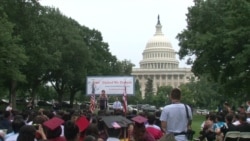WASHINGTON —
Conflicting policies may be contributing to the surge of undocumented young people from Central America trying to enter the United States. While immigration authorities say anyone who enters the country illegally -- regardless of their age -- will be deported, U.S. courts and the Obama administration have made exceptions that give many cause for hope.
In the last year, nearly 50,000 children from Central America have been apprehended at the U.S. border, overwhelming detention facilities. Many say they are fleeing gang violence and poverty. But they are also motivated by the perception that if underage children make it to the United States they will not be sent home.
Elyn Rivas, herself an undocumented immigrant living in the state of Maryland, recently paid smugglers $6,000 to bring her 15-year-old son Hector Ivan Rivas to the U.S. The boy was detained by the border patrol in Texas, but eventually was released to his mother’s custody until a court hearing is scheduled.
Undocumented immigrants
Rivas said she does not believe U.S. authorities will deport him. “No, I do not think they will send him back. I do not know. I trust they will not send him back, at least that is what I hope. I trust in God.”
Immigration opponents blame Obama’s directive not to deport undocumented immigrants who came as children before 2007 for encouraging this new wave of illegal migration.
Security analyst Adam Isacson with Washington Office on Latin America recently was in Central America interviewing migrants making their way to the United States, and heard rumors of amnesty.
“We have heard that newspapers and especially smugglers are spreading some story that until the end of this year -- why the end of this year who knows -- there is a special dispensation or a special status or something that will allow women and children to come to the United States," said Isacson
Enforcing deportation
Homeland Security Secretary Jeh Johnson recently tried to clarify the U.S. position, saying authorities will deport these young people trying to enter the country illegally.
"I also wish to make clear that those apprehended at our border are priorities for removal. They are priorities for enforcement of our immigration laws, regardless of age," said Johnson.
But Isacson says U.S. courts also could overrule deportation orders if the children can claim credible fear from gang violence. “It is possible that some of those kids do have a good chance of staying, especially if they can argue they face some danger when they come back," he said.
With 60,000 more undocumented minors expected to cross the border this year, the president is trying to get the word out that deportation laws will be enforced. He also is seeking $160 million in new funds from Congress to assist in swiftly processing the young immigrants.
In the last year, nearly 50,000 children from Central America have been apprehended at the U.S. border, overwhelming detention facilities. Many say they are fleeing gang violence and poverty. But they are also motivated by the perception that if underage children make it to the United States they will not be sent home.
Elyn Rivas, herself an undocumented immigrant living in the state of Maryland, recently paid smugglers $6,000 to bring her 15-year-old son Hector Ivan Rivas to the U.S. The boy was detained by the border patrol in Texas, but eventually was released to his mother’s custody until a court hearing is scheduled.
Undocumented immigrants
Rivas said she does not believe U.S. authorities will deport him. “No, I do not think they will send him back. I do not know. I trust they will not send him back, at least that is what I hope. I trust in God.”
Immigration opponents blame Obama’s directive not to deport undocumented immigrants who came as children before 2007 for encouraging this new wave of illegal migration.
Security analyst Adam Isacson with Washington Office on Latin America recently was in Central America interviewing migrants making their way to the United States, and heard rumors of amnesty.
“We have heard that newspapers and especially smugglers are spreading some story that until the end of this year -- why the end of this year who knows -- there is a special dispensation or a special status or something that will allow women and children to come to the United States," said Isacson
Enforcing deportation
Homeland Security Secretary Jeh Johnson recently tried to clarify the U.S. position, saying authorities will deport these young people trying to enter the country illegally.
"I also wish to make clear that those apprehended at our border are priorities for removal. They are priorities for enforcement of our immigration laws, regardless of age," said Johnson.
But Isacson says U.S. courts also could overrule deportation orders if the children can claim credible fear from gang violence. “It is possible that some of those kids do have a good chance of staying, especially if they can argue they face some danger when they come back," he said.
With 60,000 more undocumented minors expected to cross the border this year, the president is trying to get the word out that deportation laws will be enforced. He also is seeking $160 million in new funds from Congress to assist in swiftly processing the young immigrants.






